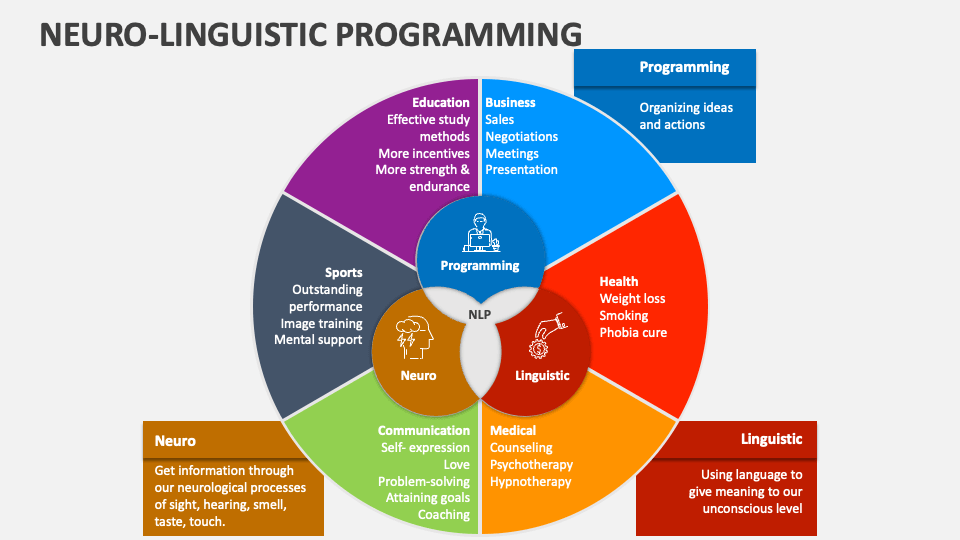
Many hypnotherapists today use Neuro-Linguistic Programming (NLP) concepts and techniques in their therapeutic practice.
NLP was originally developed in the early 1970's to model excellence.
It's founders Richard Bandler and John Grinder set out to study how top people in different fields obtain their outstanding results (Bodenhamer and Hall 2000).
Richard Bandler (with a background in psychology) and John Grinder (with a background in linguistics), studied the language and behaviour patterns of many successful sports and business people, as well as three successful therapists:
-
Fritz Perls – Gestalt Therapy
-
Virginia Satir – Family Therapy
-
Milton Erickson – Hypnotherapy
-
In addition, they were also influenced by the ideas of Gregory Bateson, an anthropologist who helped to found the sciences of cybernetics and systems theory.
-
Bandler and Grinder modelled the therapists’ behaviour patterns, then refined and developed these through experimentation and insight. They then established a new discipline which they referred to as Neuro-Linguistic Programming (NLP).
It is worthwhile to break down the name’s three components:
-
Neuro refers to the nervous system, including the brain where we process our sensory experiences; visual, auditory, kin-aesthetic, olfactory or gustatory.
-
Linguistic refers to human language and non-verbal communications. These govern the way we encode, order and give meaning to our experiences; pictures, symbols, sounds, feelings, tastes, smells and words.
-
Programming refers to the pattern of ways in which the previous two components interact.
Humans communicate with themselves and other people in terms of predictable neuro-linguistic programs. These can be discovered, used and altered in order to achieve specific outcomes.
NLP states that we can build models of successful people’s behavioural, mental thoughts, and language patterns and then use them to achieve excellence in others and ourselves.
NLP focuses attention to the way people's thought patterns involve the use of mental pictures, self-talk, and physical feelings and sensations.
-
For example, people who are anxious about the future frequently create mental pictures of failure accompanied by negative internal dialogue. They tend to focus on negative feelings and magnify them. But they can change dramatically if they adopt the mental processes and habits of well-motivated and successful individuals.
There are no explicit, formal trance inductions in NLP, but because it encourages people to focus on their internal processes, it produces a light trance and powerful changes can be made.
Because NLP was derived from the study of therapists like Milton Erickson and his indirect approaches to therapy, it is often associated with indirect hypnosis and sometimes called indirect hypnotherapy.
-
Many NLP practitioners consider themselves to be therapists, however attending 3 weeks NLP training does not make one a therapist.
-
Therapists need to be trained as therapists and understand psychology, psychotherapy and patient interaction. Learning NLP is not the same as being a therapist.
-
On the other hand, therapists who understand and use NLP are in a much better position to offer their patients additional approaches in order to help them make the changes they require.
NLP has many applications in therapy, business, education, law and any other area of life.
-
It can be used in therapy on its own and in conjunction with hypnosis, which may enhance its effectiveness.
-
In education, learning strategies are more accessible and focus can be given to an individual’s personal learning strategies.
-
If you read the Vark Learn information earlier you will understand that learners may be visual, auditory or kin-aesthetic, and learning and teaching can be designed to address these different styles.
-
In business NLP is used in sales, management and leadership training to improve rapport and communication skills. Sales training makes use of the hypnotic language patterns in normal conversation.
-
In other areas of health-care it can be applied to help medical professionals to communicate and treat other physical and psychological conditions.
-
In the legal profession, lawyers use NLP to develop more persuasive language and communications.
-
In addition, well-developed sensory acuity is an exceptionally useful tool for noticing the responses of participants in trials, such as witnesses, judge and jury.
(Richard Bandler once claimed that the term Neuro Lingusitic Programming was derived when he was stopped for speeding and the policeman asked what he did and upon looking down at 3 books in his car he replied 'Neuro Linguistic Programming' as the 3 books were on neurology, linguistics and computer programming.)
